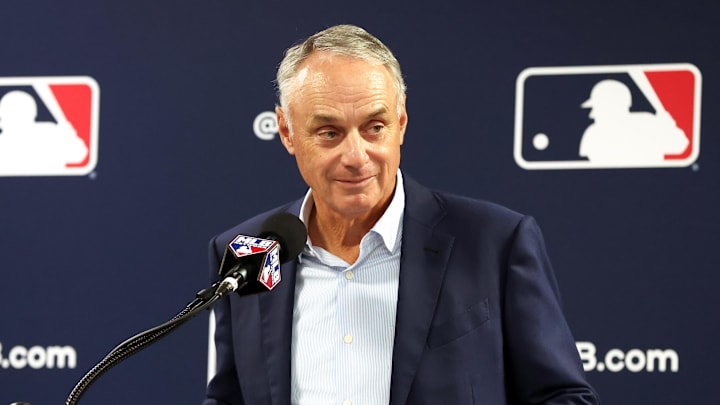MLB’s Regional Broadcasting Fiasco Has No End in Sight

Baseball is doing well, MLB commissioner Rob Manfred said Thursday in New York at the close of the spring owners’ meetings. Unfortunately, until the league works out television deals, not enough fans can watch it.
Attendance is up and national ratings are up, he said, including up “double digits” among 18-to-34-year-olds, the marketers’ favorite demographic. Games remain crisp, averaging 2 hours and 36 minutes long. But fans of the 12 teams who want to watch from home but whose broadcast rights are currently being held hostage by Diamond Sports Group are in many cases out of luck.
“There’s not much good about Diamond, actually, right now,” he said, referring to the regional sports network conglomerate that filed for bankruptcy in March 2023. “They remain bankrupt.”
Meanwhile, Diamond and Comcast have been engaged in a carriage dispute over dollars for nearly a month now, leaving some 14 million subscribers without baseball on cable.
“We just don’t have the legal right or the ability to solve that problem,” Manfred said. “We always are concerned when we have fans who are not able to watch games. I mean, it's a problem.”
At the next bankruptcy hearing, in July, Diamond is scheduled to present a reorganization plan as it tries to lift itself into solvency. Manfred said MLB had not decided whether to oppose it.
“It’s hard to comment on whether we're going to object or not because there is no plan at this point,” he said. “Their whole plan is, you know, we’re gonna get deals with distributors. We know [they don’t have them]. We’re going to continue with the other leagues. They don’t have a deal with the NBA, they don’t have a deal with the NHL and they don’t have a deal with us. So other than that!”
He added that he expected Diamond to continue to pay and broadcast those 12 teams—the Atlanta Braves, Cincinnati Reds, Cleveland Guardians, Detroit Tigers, Kansas City Royals, Los Angeles Angels, Miami Marlins, Milwaukee Brewers, Minnesota Twins, St. Louis Cardinals, Tampa Bay Rays and Texas Rangers—through the end of 2024, and that the league continues to work on the idea of broadcasting games itself. (It already does so for the Arizona Diamondbacks, the Colorado Rockies and the San Diego Padres; Diamond dropped those teams over the last 15 months.)
“There is a continuing conversation about a national control of rights,” he said. “That’s obviously a complicated topic, and it's important to separate these two issues. There is ‘MLB controls these local rights’ and ‘they come up with a program where they’re monetized.’ I think people tend to mush these together. There’s an entirely separate issue as to how the revenue flows.
“Right now we’re really focused on the strategic part: How is it that we respond to the changes in the local media environment in a way that increases our reach and fan access to our games? We’d like to get into a model where whether you’re a dinosaur cable person like I am or a digital person, there is a frictionless opportunity to watch the game that you want to watch.”
The league can only take over those teams’ rights if Diamond loses them, though, meaning at this point the league benefits most from the dissolution of its relationship with its No. 1 media partner. And no one knows when there will be a resolution.
“Bankruptcy is bankruptcy,” Manfred said. “It goes at its own pace.”

Stephanie Apstein is a senior writer covering baseball and Olympic sports for Sports Illustrated, where she started as an intern in 2011. She has covered 10 World Series and three Olympics, and is a frequent contributor to SportsNet New York's Baseball Night in New York. Apstein has twice won top honors from the Associated Press Sports Editors, and her work has been included in the Best American Sports Writing book series. A member of the Baseball Writers Association of America who serves as its New York chapter vice chair, she graduated from Trinity College with a bachelor's in French and Italian, and has a master's in journalism from Columbia University.
Follow stephapstein